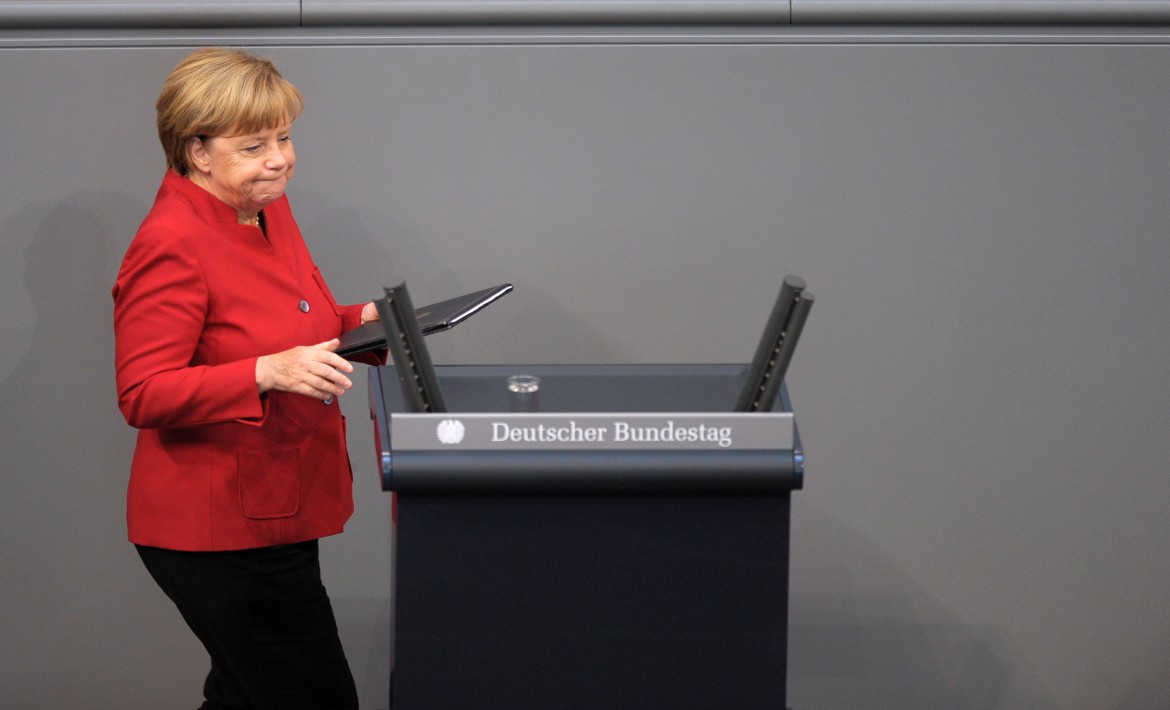Commentary
Germany and its obsession with ‘being Germany’
Berlin votes next week in a decisive test for Angela Merkel’s government.

“Germany remains Germany.” This was the closing statement of Angela Merkel’s speech to the Bundestag this week defending her “humanitarian policy” on refugees. Her words sound at the same time like a reassurance and a claim: The Federal Republic is and will remain a strong and prosperous country, and its constitution recognizes the right of any persecuted foreigner to asylum.
The main recipient of the chancellor’s message was not the right-wing party dangerously on the rise, Alternative for Germany (AfD), but the CSU, the Bavarian Christian Social Union, now antagonizing Merkel’s Christian Democratic Union. The distance between Munich and Berlin is huge, and since Thursday it’s clear that they will keep widening. The Bavarians have drawn up an official document, which is a proclamation of war. “Germany must remain Germany”: the phrase is a slogan that sounds like an open challenge to Merkel.
The difference is the “must,” a hefty verb which suggests the danger that Germany may be losing itself, its identity, with the current policy on refugees. An identity that conservative CSU interprets in a radically different way from the chancellor: Christian Germany is at risk of distortion.
The proposals by the Bavarians are breaking taboos: The full ban on the veil, a cap on the number of asylum seekers and prioritization of migrants from “Christian countries.” The specter of the Islamization of Germany is no longer used only by right-wing extremists of PEGIDA and FCA, but it has become common currency even in the “democratic” party. The appeal of the CSU to the defense of “German values” is obvious and bears disturbing similarities with the rhetoric of the “Decline of the West” and Germany threatened by “outsiders” within itself: those toxic narratives that, after the First World War, helped prepare the ground for the rise of Nazism.
The CSU’s strategy is to try to prevent the AfD from assuming the essence of its agenda. In Munich, they’d like for the CDU to do the same, but as long as Merkel is the leader that won’t happen. And now it is clear to everyone.
Inside the CDU, there is no shortage of activists and leaders who think like their Bavarian cousins. But until now, no one seems willing to dispute the chancellor’s leadership. But nothing can be ruled out: A heavy defeat for the CDU in elections in the city-state of Berlin next week could change the equation. Perhaps a kind of German Sarkozy, who could look like the Bavarian Governor Horst Seehofer. Difficult, but not impossible. There are two precedents in the history of the Federal Republic of a CSU leader at the helm of the CDU-CSU conservative camp: Franz Josef Strauss in 1980 and Edmund Stoiber in 2002.
At this stage, Merkel looks like a levee against the spread of neo-Teutonic nationalism, but it is a very weak levee. Because along with the “new” chancellor, “friend of refugees” (but also close to Turkish President Erdogan), there is the leader indifferent to social issues and economic inequality. Recently, it was announced that the Federal Republic has hit the record of temporary jobs (about 1 million), 65 percent of which had a salary below the poverty line.
The budget legislation under discussion in Parliament also provides a zero deficit this year, thus excluding the investments loudly demanded by unions and local authorities. The imbalance toward the export of the production system is uproarious, made possible by a consistent compression of domestic demand, and it is fatal for the cohesion of Europe. All these factors contribute to a depressed social climate and open the doors to those who use the dissatisfaction and disaffection among the lower-middle class for their own xenophobic and ethno-nationalist agenda.
The disheartening framework reveals what Germany is dramatically missing today: an alternative to the fascist Alternative who is not Merkel.
A leftist project that challenges the new right not only by raising the flags of the cosmopolitanism of the constitution, but also finally making a breakthrough on the social level, which would benefit not only the Germans, but all Europeans. The key condition: that the Social Democrat Party becomes social democratic, softens the Christian Democrats and builds an alliance with the Linke and the Greens. These two minor forces offer this opportunity, albeit with some contradictions. We will see in the next few months if the SPD has the courage and intelligence to take advantage of it.
Originally published at http://ilmanifesto.info/la-germania-e-il-suo-dover-essere/ on 2016-09-09
